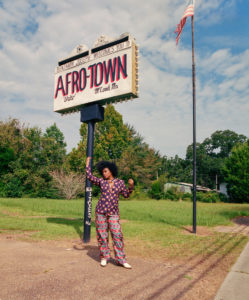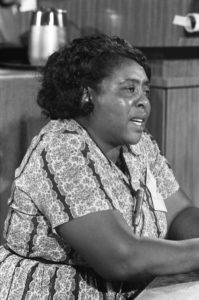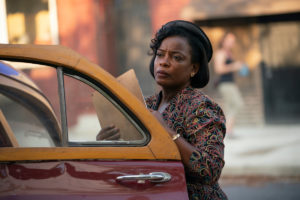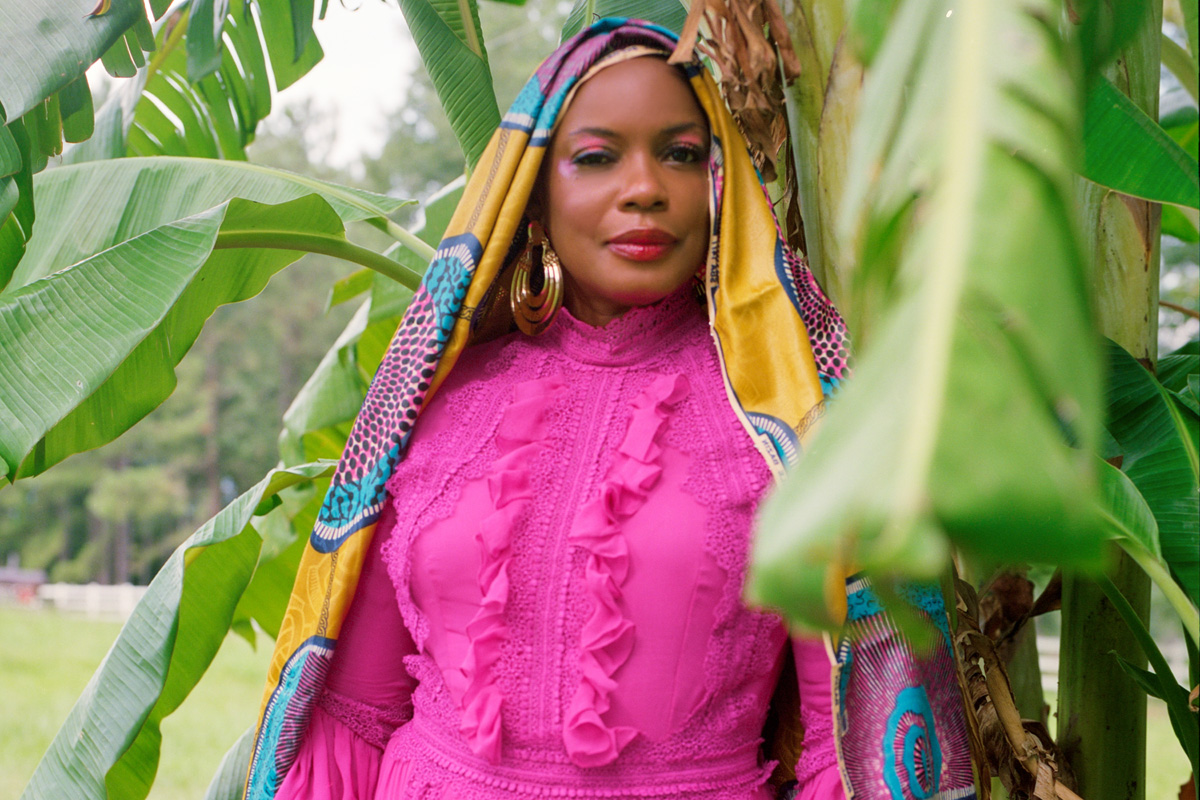Aunjanue Ellis is made up of a vast, cosmic imagination rooted in Mississippi soil. Her imagination is forged from her grandfather’s study, where atlases and geography books twice her size exposed her to other lands.
“I lived and still live in the woods, and for me the night sky was my canvas for those other worlds. I dreamed and imagined constantly, and there was nothing left out. The awful, the mundane, the fantastical were all players in that alternate reality,” she tells the Mississippi Free Press in a phone interview on Nov. 7.
Ellis, 51, has been an actress since her childhood days in McComb, Miss., where she played church with her young friends and family members. It was her first understanding of portrayal and interpretation.
“There was a minister, deacons and mothers in our ‘church.’ We all had roles to play. We would dress up accordingly,” she says.
Small children dressed in their finest church clothes clapping, shouting and dancing in imitation of what they witnessed on Sunday mornings. One child taking on the raspy burr of the pastor, voice elevating in pitch and volume as they’re caught in the rapture of preaching. Children running around, shouting and praising with the holy spirit.
I felt this animated spirit in Aunjanue Ellis. When she’s passionate about something, she claps in between her words for emphasis. Picture Iyanla Vanzant’s infamous “Not on my watch!” scene from “Iyanla, Fix My Life.” When Ellis is really feeling something she says, she shouts “Come on now!” like a church mother on Sundays.
She reads “Love” by Toni Morrison, Deesha Philyaw’s “The Secret Life of Church Ladies,” Daniel Black’s “Perfect Peace.” She listens to old heads like The O’Jays and gospel royalty like The Winans, but keeps it modern with Frank Ocean, H.E.R. and SiR.
The Moth, Snap Judgement, QLS and Invisibilia are the podcasts she’s listening to right now. She might listen to City Girls, too, if the frequency that she proclaims “Period!” is any indicator.

Her mother Jacqueline Taylor, her grandmother Myrtis Taylor and her sister Sasha Taylor-Barnes are the women in her life who have influenced her the most. In turn, she plays Black female characters that give her work purpose.
Ellis is not ashamed of where she comes from, wearing proudly on her Twitter handle that she is a “proud Mississippian.” She lives in Mississippi, although I won’t say where out of respect for her privacy, and she is determined to do better for this state for the next generation emerging from its trenches.
There’s a familiar feeling that emerges in conversation with Aunjanue Ellis. I expected her to be more reserved based on former interviews with her I’d seen. But alone, she’s a force to be reckoned with. Throughout our conversation, what I discovered was that in addition to being a well-known actress, Ellis is that Black, southern auntie that every Black family cherishes.
She’s the Black aunt who’s more like a best friend or sister. You can laugh with her and tell her secrets you’d never unearth to your parents. She keeps with the times and with what the youth are into without it seeming corny or cringey. She’s staunchly honest about everything, regardless of whose feelings may be affected. But it’s out of love, at least if she likes you.
Ellis radiates an aura that says she can cook a mean pot of collard greens and cornbread, though gumbo is her favorite. She looks like gives big hugs filled with warmth and love.
The actress and I only talk by phone, but if I close my eyes and imagine hard enough, I can see Ellis and I conversing at a kitchen table with a glass of sweet tea. We start with the election, and the conversation takes off from there.
‘American Psychosis’
It’s four days after the presidential election when the majority of the country breathes a collective sigh of relief. Hands can unclench, with anxiety abated for the majority of voters as it is announced that Joe Biden and Kamala Harris have won the 2020 election. Celebrations are breaking out across the country following the results because who could say with certainty how the election would have turned out given how dismal the year has been thus far. The tragedies, the protests, the pandemic, it was all leading to this.
Aunjanue Ellis is watching the celebrations from her temporary home in California where she is currently filming a movie. She is relieved, she tells me, and happy to be able to engage again after three years of not watching the news.
“I feel that the presence of 45 has been an assault on my mental health quite frankly. It bleeds through my reality whether I actively engage in it or not. Just to know that that man will not have any sort of authority over my life or the lives of my family in the next two months is a tremendous weight lifted today,” Ellis says.

The Mississippi-born actress holds back nothing as she calls Trump everything but a child of God. He’s a narcissist. A pathological liar. A monster seeking attention. A being she could not continue to pour her energy into.
“The force of this man, unfortunately, is irrepressible. The reason why is because he is the embodiment of white suppression,” she says. “When you’re watching all these people continue to vote for him, what you’re seeing is white supremacy not wanting to die. If (his presidency) dies, then it’s a blow to white supremacy.”
Ellis remembers reading a few years ago about a southern, white man who was ill, yet refused insurance under President Obama’s Affordable Care Act. He eventually succumbed to his illness because choosing Obamacare for him would be a concession, one his white pride wouldn’t allow, she infers.
“I believe that this will be codified as a form of psychosis because it is a willful choice to do something that deleterious to you, that is against your interest, that endangers your life, and yet you choose to do it. And do it again. That is psychotic,” Ellis says.

Mississippi is part of that problem with its long history of slavery and white supremacy. It was just this year that the Confederate emblem was removed from the state flag’s canton, and it was only seven years ago that the state officially ratified the 13th Amendment, which abolished slavery, 148 years later after emancipation.
“Black Mississippians in particular are incredibly civic-minded and do vote; we just don’t have the numbers. If all of us voted, still, it wouldn’t be enough to put Mike Espy over,” Ellis believes about the Black former agriculture secretary who again lost the US. Senate race to Cindy Hyde-Smith.
“The thing about Mississippi is there are forces that don’t want the state to improve, and I think one of the reasons why is because if the state improves that, that means that the doors of the state will be open, and it will expose things that they don’t want to let go of,” Ellis says.
In a state that long required Black people to sit in balconies to see a movie, there hasn’t been a movie theater in McComb since Ellis was in high school. It closed maybe 20 years ago, she says, just as the majority-Black capital city of Jackson no longer has one. Occasionally, locals in her hometown hear teases of one being built, but no progress has been made yet.
“I know for a fact that there are forces and people in McComb who are standing in the way of that happening,” Ellis tells me. “That’s just one example, but it’s rooted in this culture that has gone unchecked for so long, and it fights doggedly to protect itself. Until that is dismantled, the state is not going to grow in the way that it should, so we have to figure out other stuff.”
Fannie Lou Hamer at the Capitol: ‘We Have To Do It’
In 2015, Ellis pulled her film company, Miss Myrtis Films, out of Mississippi and moved to Louisiana in protest of the Mississippi flag.
The new flag is red, blue and gold with a white magnolia enclosed by a circle of stars and the phrase “In God We Trust.” Mississippi, after all, is in the Bible Belt region of the country.
“I’m happy that there is a new flag, but I just did not want that Confederate flag to be there. Whatever was chosen, it really would not have mattered to me outside if they had chosen the Stennis flag,” she said of a flag alternative designed by the granddaughter of a long-time Democratic U.S. senator from Mississippi.
John C. Stennis fought against racial equality during his 40 years in office, Ellis points out. He also has a seventh Nimitz-class nuclear-powered Navy supercarrier, the USS John C. Stennis, named after him, which Ellis thinks should also be changed.
“You have them insist that ‘In God We Trust’ is on it, and I insist that I do not have the same God as people who vote for Cindy Hyde-Smith. I just don’t. I just don’t understand this idea of ‘In God We Trust’ because I just want to know whose God?” she says.
The flag speaks to a larger issue the country is facing when it comes to relics that represent the racist past. This year, there has been an ongoing fight to get Confederate statues taken down across the U.S. and Mississippi, especially in college towns with public universities. In Jackson, Belhaven University, which is a private Baptist college, renamed a dormitory, which was named after Guy T. Gillespie, a segregationist who argued that racial inequality and separation were proper Christian views.

Ellis isn’t concerned with those statues or where they go, though her suggestion is that they go to the trash. Her focus is on making sure women, Black women in particular, are immortalized in similar ways. She is hoping to start that movement with Mississippi’s very own Fannie Lou Hamer.
Hamer has a statue near her grave in her old neighborhood in Ruleville in Sunflower County, but it is off the main road and hard to see, Ellis says. She would like a Hamer statue at the Mississippi Capitol building, where many Mississippi men are memorialized, as well as a statue of Confederate women the mother of racist segregationist Sen. James O. Eastland spearheaded.
“What we have to do is we have to do it,” Ellis says. “You write that and put that in your article, and I’m going to get with some people, and we’re going to work on that.”
The actress is also focusing her attention on the education sector of the state. In the wake of the pandemic, many children have had to stay home and learn virtually, but they may not have access to WiFi to do so.
Mississippi is ranked as one of the top 10 worst states for broadband access, Broadband Now reports. A total of 112 internet providers operate in the state, but 258,000 Mississippians are without any wired internet providers in their communities, and 236,000 people have access to only one provider at their place of residence, the report continues.
“I heard this story about kids doing their homework outside of McDonald’s, and someone calling the cops on them. That’s unacceptable,” Ellis says. “You shouldn’t have to choose and if you want your kid to stay home, that should be an option.”
In September, AT&T, in participation with the FCC’s Connect America Fund, expanded high-speed internet to 65 counties in the state, WLBT reported. But that still leaves 17 counties without assistance. Ellis is partnering with The Links, Incorporated, a Black women-led international nonprofit corporation that is making sure kids have access to hotspots.
Ellis is not delusional in thinking that the victory for Biden and Harris means the work is over. The leadership of the country is only as good as the country itself, and history shows the United States is capable of anything if left unchecked. She wants to create systems, particularly for Black women, that operate for us regardless of who sits in the white house, she says.
“We have to have things in place so we will be president-proof,” Ellis says. “I’m making it my business to work towards that in every facet of our existence with our health, our culture, with education (and) actively organize around creating structures and infrastructure that is president-proof.”
‘A tribute to Black Women Because They Deserve That’
In Episode 7 of the HBO’s series “Lovecraft Country,” called “I Am,” Hipployta Freeman (played by Ellis) and Josephine Baker are smoking a cigarette at a bar. No, really. Hippolyta Freeman is glammed up in a bob haircut, white lace and black sheer top and a bedazzle choker. This is a stark contrast to the prim and plain dresses and hats Hipployta wears as a 1950s black housewife and mother.
“Now that I’m tasting it, freedom like I’ve never known it before, I see what I’m robbed of back there,” Freeman says to Baker. “All those years I thought I had everything I could have ever wanted, only to come here and discover that all I ever was was the exact kind of Negro woman white folks wanted me to be. I feel like they just find a smart way to lynch me without me noticing the noose.”
Hippolyta, who has been buried under the role of wife and mother, has finally experienced what it’s like to put herself first. Her Wizard of Oz-esque adventure takes her many places and teaches her many things that when she finally returns home, without the red glittery shoes to get back, she’s more self-assured and confident as a mother and as a Black woman.

“Lovecraft Country” follows “one man’s journey across 1950s Jim Crow America. A road trip in search of his missing father turns into a fight to survive racist terrors and Lovecraftian monsters,” HBO describes.
Hipployta accomplishes a lot of amazing feats on her journey of self-discovery, which Ellis says she often forgets when fans regal her with their love for the character.
“In retrospect, I look back at it, and I think, ‘oh wow, that was cool.’ I hear people talk about it, and I go, ‘oh yeah, that is right, I did do that.’ She went to France and danced with Josephine Baker. Oh, I did say that,” the actress says.
Those feats do not come without a cost to Hipployta’s relationship with her daughter, Diana Freeman (played by Jada Harris). I do not hesitate to tell Ellis how much I disapproved of some of her character’s decisions. I may or may not have called Hipployta a “heffa,” but Ellis takes it in stride, laughing while I ranted.
“I like the idea that you got frustrated with it. Her choices affected you,” she says. “I think that to me is what’s exciting about writing characters like that. That people can watch it and feel complicit and feel moved and feel angry.”
Ellis says it can get boring playing the same stale characters that tell the same worn stories. She has played a multitude of characters who have been through hell, but it’s rewarding for her.
She’s portrayed Sharonne Salaam, mother of Central Park 5 survivor Yusef Salaam, in Netflix’s “When They See Us.” The feisty church mother and choir director Dr. Mattie Moss Clark in Lifetime’s “The Clark Sisters: First Ladies of Gospel.” And most recently the mother, wife and space explorer that is Hippolyta Freeman in HBO’s “Lovecraft Country.”

Women come up to Ellis and say they felt seen or heard by watching Hippolyta, which gives her purpose, she says. “That means so much to me because I want to do work that is a tribute to Black women because they deserve that,” Ellis said.
The Mississippi native drew on her southern roots to help craft the character of Hippolyta, a Chicagoan. Chicago has direct ties to Mississippi through the Great Migration, which was the movement of 6 million African Americans from the South to the Northeast, Midwest and West from 1916 to 1970.
“Sometimes, she had to go in there and make pies, and that’s some southern language. That’s a southern habit, making pies on big occasions,” Ellis says.
It was the “Now, get in the f*cking car” line that really brought out the southern grandmother vibes for me. A tone of voice that screams “I won’t ask twice,” a sentiment I’ve been the target of a time or two.
“I’m so southern. I am so southern, so Mississippi that I have to really be aware of not bringing that into every role,” she says.
‘Well Fed with Food. Well Fed with Music. Well Fed with Family’
It’s the way Mississippi musicians play guitar like no other. It’s her family legacy. It’s the Mississippi quartet music. It is Mississippi gumbo, which is better than Louisiana’s, her words not mine. These are the things Aunjanue Ellis loves most about being from Mississippi, she says.

The actress could live anywhere in the world, yet she chooses to live in Mississippi. New York is too expensive for her, and California is too attached to the film and television industry, she says. Mississippi is where her family is. Mississippi is where happiness is, in her words. Photo by Imani Khayyam
“I am usually able to be half the time where I’m working and half the time at home. As soon as my job is done wherever it is, that’s where I go,” Ellis says.
But when she’s away filming, Ellis brings pieces of home with her through the keepsakes she has from her niece and nephews. Framed pictures, her niece’s drawing of them together, their socks. Quarantine hasn’t afforded Ellis many opportunities to be with her family due to social distancing and filming, she adds.
“They’re my everything, and to not be able to see them as much as I’m used to seeing them, that redefines you. It’s redefining. I still don’t know what I’m going to look like on the other side of this,” she says of the pandemic.
Yet, on the flip side of things, Ellis has been more productive, pouring her energy into writing and a new Black Mississippi arts revival project called Be More. In partnership with other Black women from the South or with southern roots, the goal of the project is to transform the vacant walls and buildings throughout Mississippi cities into art galleries.
The actress wants to start the first mural by the year’s end in her home county and then expand to other parts of Mississippi. It’s a way to add to the artistic legacy of the state.
“There (will be) murals, but what we’re trying to do is make it so that it’s not incidental,” Ellis says. “It would be an artist or several artists and we think the first one we’re going to be able to do is at South Pike High School in Magnolia, Mississippi. We are inviting Black women muralists to work on our vacant walls (art) that they would put in an art gallery.”

As a child, Ellis had to go outside of the state to fully experience a hotbed of artistic expression. When she went to New York, she was exposed to art everywhere. Today, she has to take her niece and nephew, who live in Hattiesburg, to an art gallery in New Orleans.
“My friends that I met were so far ahead of me culturally because they experience art just by getting on the subway. You ride the subway, and there are poems by great poets on the subway. And that determines how you see the world,” Ellis says of New York.
Fannie Lou Hamer once said, “Never forget where we came from and always remember the bridges that carried us over.” Ellis can never forget where she comes from, not when those same bridges are the pathway to take her back home.
“Finish this sentence: To be a southern, Black woman from Mississippi is to be …,” I ask Ellis at the close of our conversation.
“I would say to be a southern, Black woman from Mississippi is to be well fed,” she answers. “It is another kind of journey, though, because it has made me be better because I’m not coming from no type of privilege, you know what I‘m saying?”
“I come from a lack, and I create what should be there, and anyone coming from there would say the same thing. So what I would say is to be a southern, Black woman from Mississippi is to be well fed. Well fed with food. Well fed with music. Well fed with family.”






